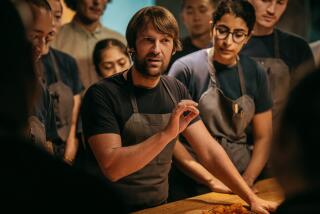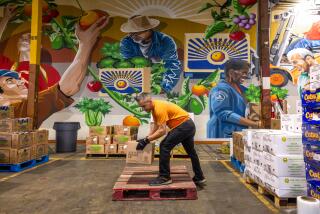You’ll eat every last carrot when you buy from the farmer who grew them
I have always considered myself food-conscious. I read books about basic agriculture, understand seasonal cooking, and know not all waffles originate from a toaster. But a monthlong 100-mile diet has shown me how much I have yet to learn and instilled in me a deeper respect for food.
My approach to cooking has been heading to the store, armed with a recipe for fish with a cilantro dressing. I buy the cilantro, use only half a bunch in the dish, and chuck the leftover stalks in the refrigerator’s nether regions, only to toss it, wilted, into the garbage a week later.
I have long tried, unsuccessfully, to remember these leftovers at the bottom of my vegetable drawer in time to add them to a salad or salsa. I try to clean out the refrigerator once a week, tossing moldy carrots, limp celery, and lots and lots of cilantro.
RECIPES: 15 easy dinners - pasta, enchiladas, shrimp skewers, more
Yesterday, I buckled down for my ritual dig of “find the forgotten produce” and came back up with only half of a now crunch-less cucumber. I had used up all of my cilantro.
This past month, I have polished off almost all of my produce, even the bits that I normally skip. I cooked not only my beets but their greens as well and, when I spotted some mold on my carrots, I cut off the offending chunk and carried on with my recipe.
This thoroughness is partially because they were more expensive than the supermarket variety, but primarily because I met the farmer who had picked them. As a consumer, when I purchase from small farmers, I am far more aware of food production. When choosing between types of apples, I ask the fruit seller about the differences between a Pink Lady and a Fuji. I now buy lettuce from the same woman every week and we chat about her wild arugula and worry about late frosts.
Through a local diet, I feel connected to my food and make a point of eating everything I buy, wanting to respect what someone’s livelihood created.
Also, I have stopped shopping from recipes. I now go to farmers markets, searching for what looks the best and building menus around a vegetable. This has led to some interesting results. I absolutely despise radishes; I eat a sliver about once a year, just to double-check that my taste buds haven’t dramatically reversed themselves. Yet, every time, I swallow it with a grimace and immediately gulp down a tall glass of water. Still, last weekend, when I saw a bunch of the most beautiful radishes I have ever clapped my eyes on, I was inspired to try them again.
Never having eaten a cooked radish, I sautéed the bunch, greens and all, in butter, salt and pepper. I also popped some carrots in the oven to roast and blitzed up their tops with olive oil, lime juice, and a wedge of preserved lemon to dab on top.
The radish greens were disappointing; I would consider adding them to a soup in the future but they were too prickly for my taste. As for the carrots tops, I was pleasantly surprised. Yes, I did dump a massive amount of citrus into the sauce, in large part to mask the greens’ bitterness with a lemony zing, but the tops added a hearty vegetal undertone. And the radishes were second-helping good; a few minutes over the stove transformed them into buttery pastel disks with a mellow spice and crunch.
I may still not be in love with the radish, but we are now happily on speaking terms.
ALSO:
Finding your daily bread -- locally
A locavore’s grand sacrifice -- giving up chocolate
The saving graces of local eggs and cheese
More to Read
Eat your way across L.A.
Get our weekly Tasting Notes newsletter for reviews, news and more.
You may occasionally receive promotional content from the Los Angeles Times.










